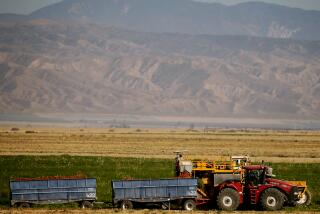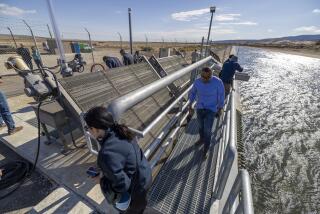Kern County Farmers Short of Water, Time : Drought: Many are left without their major supplier after State Water Project decides to halt deliveries to agriculture. Losses of crops and jobs are expected.
- Share via
WASCO, Calif. — If this were a normal February, you’d find Don Elholm out west of here on his farm in Lost Hills, irrigating alfalfa and painstakingly preparing the hard, brown Kern County earth for another year’s cotton crop.
Instead, he’s at home at the kitchen table, smoking cigarette after cigarette, trying not to fret about the future.
“Can’t plant,” Elholm, 51 and a third-generation San Joaquin Valley farmer said, looking down at hands callused by three decades in the field. “No water, no crop. It’s as simple as that.”
For five years, the state’s deepening drought has been nipping at the heels of California’s farmers. This week, it caught up with them, as the state announced it was halting all State Water Project deliveries to agriculture to preserve remaining supplies for cities.
News of the unprecedented action has struck particularly hard in northwestern Kern County, a parched, gently sloping plain that belonged to the sagebrush and jack rabbits until the state built a mighty aqueduct that first brought water down from the north 23 years ago.
While many portions of the San Joaquin Valley sit atop vast ground-water basins that will help compensate for the abrupt disappearance of state-supplied water, scores of farmers such as Elholm have no such ace in the hole.
These growers, who farm 214,000 acres in five water districts, rely exclusively on water imported by the State Water Project to bring their barren land to life. Their crops--half of them permanent plantings such as grapes, almonds, pistachios and fruit trees--account for more than a quarter of Kern County’s agricultural production.
In the cafes, churches and at the John Deere dealerships in this farm belt, the mood has quickly grown subdued. Even the most optimistic growers--the seasoned veterans who have weathered the pinch of droughts before and bounced back, leaner and meaner--are fighting a creeping panic.
“It’s like your house is on fire and the fire hydrant just runs dry,” said Ronald Khachigian, senior vice president of a company that grows grapes, almonds and assorted annual crops on 9,500 acres off California 46, west of Interstate 5. “We’re burning and there’s not a darn thing we can do about it.”
Since the state announced it was shutting off the farmers’ spigot, the engineers and other experts at the Kern County Water Agency have been scrambling to find alternate sources of water for its customers. Their goal is to “scrounge up enough water to just keep the permanent crops--the vines and the trees--alive,” said Tom Clark, the agency’s general manager.
The costs of failure would be severe, and while the farmers are at the front lines, they won’t be the only casualties. Already, some fertilizer companies report business is off 30%, and at the agricultural machinery outlets, sales are lagging and customers are asking for extensions on their payments for financed equipment.
“The handwriting is on the wall,” said Clayton Camp, manager of West Kern Machinery in Buttonwillow. “If there’s no water, they won’t be planting. And if they’re not planting, then they’ve got no need for our cotton pickers.”
Pleading his case during frequent trips to Sacramento, Clark has persuaded the state to temporarily continue minimal water deliveries to Kern County. The agreement requires the agency to repay the water loan as soon as local supplies are developed through the drilling of new wells or other means.
Meanwhile, the farmers are hunkering down. Some are scurrying to cut deals with ranchers who might have excess water to sell. Others are offering their tractor and services to ranchers blessed with enough water to plant. Still others are spending a lot of time in church, praying for precipitation and for their banks to have a heart.
“This isn’t totally unexpected, because we noticed it didn’t rain much in January,” said Fred Valov, 35, the son of a grower and an entomologist with Simplot Soil Builders in Delano. “But farmers have always had this feeling that a rabbit would be pulled out of a hat, and things would turn out OK. I think that hope has faded now.”
As they always have, western Kern County growers continue to congregate each morning at the Wasco Inn Coffee Shop, piling out of their mud-covered pickups and gathering at large tables for eggs and bacon. But this year the talk is not of when the almond trees might burst into bloom. Now the topic is survival--how to make it through a fifth consecutive dry season.
“There’s a lot of gloom and doom,” says Roger Frantz, 64, a Wasco Inn regular whose father moved his penniless family to the Central Valley after agriculture went bust in Texas in the 1930s. “I’m trying to be more optimistic. I don’t want to lose everything I’ve worked for for 43 years, but I’m not gonna feel bad about it until it happens.”
Frantz, who grows cotton, hay and almonds on 2,200 acres southwest of Wasco with his son, Sam, and son-in-law, Barry Braun, admits he is one of the luckier ones. The Frantz farm relies mostly on ground water.
Even so, the drought has taken a bite out of Frantz. Because the underground water level has dropped dramatically in recent years--falling as much as 80 feet in some areas last summer--Frantz has been forced to spend $15,000 to deepen his five wells. Pumping water a greater distance means higher utility bills, a problem compounded by Pacific Gas & Electric’s recent rate increase.
As other growers previously reliant on state water turn to wells to get by, the underground supply will continue to dwindle, perhaps forcing Frantz to drill still deeper.
“It may well come down to who has the longest straw,” said Frantz, a lanky sort who favors cowboy boots and a plaid Western shirt. “We’re skating on thin ice.”
Fred Starrh, 61, feels like the ice has already cracked beneath him. He just hopes he doesn’t fall through.
Starrh and his sons, Fred Jr. and Larry, grow cotton, almonds and hay on 8,000 acres west of Shafter, in a district entirely reliant on state water. Starrh has farmed all his life. He has never seen a year like this one.
Already, he has written off the 4,500-acre cotton crop. The alfalfa’s in the ground, but he will abandon that after one cutting, sacrificing the six additional cuttings that amount to almost nine tons of hay in a typical year. In all, he figures, the water cutoff will cost the farm $6 million in gross revenues. The normal annual profit of $150,000 is history too.
If he can scare up any water, Starrh will use it on his 265 acres of almond trees. It’s unlikely he’ll get enough water to make a crop; at this point, he’s just hoping for enough to keep his trees alive.
“It’s all just one big negative,” Starrh said sadly as he gazed out through the thick valley fog at his desolate land. “We’ve already laid off 40 people, and by summer it could be 100. It’s hard to do. It’s hard to lay off people who’ve worked for you for 40 years.”
Craig Fulwyler, 31, has a 1,500-acre farm near Wasco, where he, his father and his uncle mostly grow onions, black-eyed beans, cotton and hay. The December freeze hurt the onions. Now, the state water--Fulwyler’s principal source--has been turned off. It’s a time to take stock, make choices.
Fortunately, Fulwyler has 12 wells, but four are in need of repairs he expects will cost $40,000.
“I think we’ll make it through this year, but we don’t have any cushion, and that’s very nerve-racking,” said Fulwyler, who has three young sons he hopes will take over the farm “if there’s anything left.”
Fulwyler, whose grandfather began growing potatoes in the valley in the 1940s, is a young man and probably could regain his footing if the worst were to happen. But he worries about his father and his uncle, who built the business and live off of its earnings.
“My big fear is that I’ll lose what my father and my grandfather worked all their lives for,” Fulwyler said solemnly. “You have one big crop failure and that’s it, their investment, their future security, is just gone. That’s what weighs on me.”
KERN COUNTY’S WATER DILEMMA
Five water districts in Kern County have been hit particularly hard by the state Department of Water Resources’ elimination of water deliveries to agriculture. These districts either have no ground water or have ground water that is too poor in quality to use. Farmers in these districts are scrambling to find alternate sources to keep their trees and vines alive this year. Thousands of acres of cotton, alfalfa and other annual crops will not be planted. 1. Lost Hills Water District 2. Berrenda Mesa Water District 3. Belridge Water Storage District 4. Cawelo Water District 5. Wheeler Ridge-Maricopa Water Storage District
More to Read
Sign up for Essential California
The most important California stories and recommendations in your inbox every morning.
You may occasionally receive promotional content from the Los Angeles Times.













